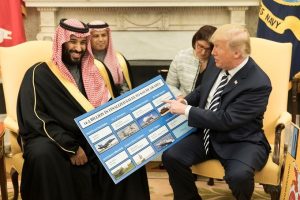by Nicolas Dunais
Martin Griffiths, the UN special envoy for Yemen, recently published an op-ed in the New York Times, rightfully calling for an end to the Yemen war before it expands into a broader regional conflagration. The guidelines he offers are, however, very aspirational, offering little pragmatic advice as to what exactly needs to be done. Saudi Arabia’s leadership needs to bring back the old Yemen hands and re-establish its influence with the tribes of northern Yemen. But before it does that it will need to first recognize the failure of its intervention- a difficult acknowledgment at a time when nationalism is being played up by the Saudi regime.
When Mohammad Bin Salman—a then 31-year old Minister of Defense—decided to intervene in Yemen, his expectations were that Sana’a would be taken within months. After all, Saudi Arabia was in the global top 5 of countries in terms of military expenditure, and great military kit could only mean great military prowess. Or so the story went. The combination of a lack of planning, a lack of combat experience, and a reluctance to sacrifice Saudi blood to minimize opposition to the war meant that foreign forces were called for support. But even with the help of the Emiratis, Americans, British, French, Sudanese, Jordanians, Moroccans, and countless others the Houthis remained entrenched in northern Yemen. A brutal air campaign and economic blockade ensued, leading to significant loss of life and infrastructure, prompting UN calls for a cessation of hostilities and a return to the negotiating table. But at a time when Saudi Arabia was pushing a nationalist agenda and was seeking to demonstrate its military might, diplomacy would have been considered a sign of weakness, and such calls were ignored.
In March 2018, when the Houthis launched multiple simultaneous missile attacks on Saudi Arabia, I was advising the government on the establishment of a national risk and resilience unit for the kingdom. The unit’s task was to identify, assess and mitigate a broad array of risks, current and future, including natural hazards, human-induced accidents and malicious actions. To its credit, the ministry spear-heading this initiative on behalf of the Royal Court was very receptive to the suggestions being put forward and recognized the imperative to have this unit become operational as rapidly as possible. As a result, with the support of some very bright and hard-working Saudi civil servants and the blessing of the ministerial office, we had initiated our engagement with the owners of the national risks we had identified.
But while the Houthi missiles were starting to come in more regularly, the authorities did not overly worry about them, given the kingdom’s air defense systems’ apparent efficacy at intercepting them before they landed. The smoke-trails of Houthi missiles lining the Riyadh skies did not spook anyone, and residents would cheer while filming the interceptions before posting them on social media. Rather, the immediate concern seemed to be more about the avian flu outbreak that was spreading across the country, leading to the mass culling of poultry and birds—a certainly valid worry given the implications on food prices, and the potential social risks this could represent. However, suggestions to consider the risks related to the missile threat and to undertake an indirect dialogue with the Houthi leadership were summarily dismissed given the confidence that military might alone would be enough to crush an ragtag army of rebels. In the months that followed, missiles continued penetrating Saudi airspace, later followed by deadly drones which wreaked havoc in the provinces of Jizan, Najran, and Abha near the Yemeni border, and then started reaching oil installations further north, the latest one perhaps being the Abqaiq processing plant earlier this month.
Saudi Arabia can no longer afford this escalation to continue. For all his vocal support, Donald Trump is unlikely to risk a regional flare-up, and Saudi Arabia cannot afford to hit back at Iran if it turns out the attacks originated from Iranian territory. As Iran and the Houthis are emboldened by their successes, the situation will only get worse. To get out of this spiral, the focus for Saudi Arabia should be to engage directly with the Houthis and re-establish the kingdom’s influence in the Yemeni highlands, an influence it had but then gradually lost following the signature of the Jeddah Treaty in 2000 demarcating the borders between the two countries.
Saudi involvement in Yemen predates the 1962 Yemeni revolution, when it supported the royalists led by the Zaydi Imam against republican forces backed by Egypt. As former Saudi King Abdullah bin Abdulaziz reportedly said in 2007, Yemen’s security was “inseparable” from Saudi Arabia’s security, which indirectly justified what others would qualify as foreign meddling. Saudi Arabia supported tribal leaders, academics, military officers and politicians with generous monthly stipends, allowing it to ensure its security interests. Sheikh Abdullah al-Ahmar, the head of Yemen’s Hashid tribal confederation (one of the most powerful and populous in northern Yemen) and speaker of the Yemeni Parliament between 1993 and his death in 2007, was reportedly paid billions of riyals monthly, directly out of Saudi Arabia’s coffers. In Riyadh, a dedicated “Special Committee” for Yemen Affairs monitored and steered political developments in the country, while also ensuring it kept other foreign meddling at bay, notably Egypt’s and Iran’s.
As the first decade of the millennium was reaching its end however, two notable developments led to Saudi Arabia losing its grip on the north of Yemen. In 2005, Prince Sultan bin Abdulaziz, who had headed the Special Committee for more than a decade, was struck with illness and deteriorating mental health, requiring him to seek treatment in the United States. He lost focus on Yemen, and funding for the tribes started drying up. This was further accentuated in 2007 when Abdullah al-Ahmar died, leaving behind ten sons whose political bickering further undermined the confederation’s cohesion, making it more difficult to secure Saudi’s interests. When Prince Sultan died in 2011, the Special Committee existed only in name, and seismic changes were already under way in Yemen that would ultimately lead to the Houthis’ take-over of the capital and vast swathes of the country.
Despite a significant loss of Saudi institutional memory on Yemeni affairs and a fratricidal war that has torn apart Yemen’s tribal and social fabric, there is a desperate need for Saudi Arabia to reimpose its influence. While it is understood that MBS’s brother Khaled is now in charge of the Yemen dossier, it is urgent to bring back the prominent Saudi experts who played an active role in the Special Committee. This is particularly the case for Dr. Musa’d al-Aybaan, who has acquired an unparalleled expertise in tribal affairs thanks to his involvement in the demarcation of the Saudi-Yemen border in 2000. Experts like al-Aybaan should be involved in a parallel diplomatic effort to the one at the UN, where Saudi Arabia directly engages with the Houthis with an eye toward establishing a full, or at least a partial, ceasefire.
For this to succeed, it will be fundamental for Saudi Arabia to guarantee the Houthis a place in the future government of Yemen and commit to reconstructing the civilian infrastructure that has been destroyed. Saudi Arabia will also need to provide guarantees that it will not support the establishment of Salafi schools in the Zaydi heartland of northern Yemen, while in return the Houthis will need to commit to stopping their cross-border attacks, and more importantly end their relationship with Iran and its affiliates. By favoring diplomacy over confrontation, Saudi Arabia has the opportunity to prove it is a mature actor on the world stage and, in the process, undercut the arguments of its detractors. And if pride is still preventing this from happening, then it’s important to remember Atal Vajpayee’s words: quiet diplomacy is far more effective than public posturing.
Nicolas Dunais is an independent advisor to GCC governments on matters of economic development and security. He has been living in the Middle East since 2004, first as an Arabic student in Yemen, then as a management consultant. Nicolas has a MSc in communication systems engineering from the Swiss Federal Institute of Technology in Lausanne, and a post-graduate certificate in international relations from the University of Leicester. He is also certified by the Handa Center for the Study of Terrorism and Political Violence, and holds a certificate of international economics from Johns Hopkins School of Advanced International Studies.






The goals set for KSA, even in case of wise management of the issue from now on, seem too big for now. Maybe if they followed a diplomatic way 2 years ago they could dream of such foothold in Yemen that the author suggests.
Best analysis I have seen in a long time. That in itself is a sad commentary. Actually the Saudi-Houthi resolution is relatively well known but not yet at the ready point. The tribal mess in the South and Sunni heartlands may be even more complex. As the author explains, in the end compromise will be needed and a Lot of money. As yet no neutral mediator has emerged to facilitate the several future peace processes. That is another unknown factor to worry.
Charles
This article is a Saudi Arabian fantasy, seeking to restore rosy status quo ante bellum that, in fact, never existed.
Houthis (and Iran) are no longer looking for diplomatic solutions etc. The war inside Yemen is now being waged by Houthis to destroy all possible internal opposition to them. In that they are supported by Iran.
More attacks against UAE and Saudi Arabia by Houthis are highly likely.
Houthis, from now on, are the Present and the Future of Yemen.
Les joux sont faits.